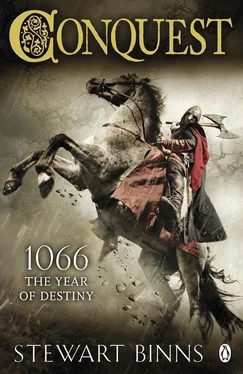A thick rope was tied to the net, thrown over the sturdiest branch and Hereward, barely conscious and unable to put up a struggle, was hauled into the air. His assailants secured the rope to an adjacent tree, leaving Hereward swinging like a trapped animal. After they had pulled his hands through the net and tied them firmly to the rope above him, they threw a pail of cold water over him to bring him back to full consciousness. The leader then spoke to him in stilted English in an accent that Hereward found difficult to understand.
‘When I finish woman, I come back. I geld you so you become quiet boy. I not hurt you much, my blade very sharp.’ His face contorted in a demonic grin as he reinforced his point with a deep slash to Hereward’s cheek.
Hereward found it hard to speak; the net was cutting into his jaw. ‘You’d better kill me, foreigner. If you don’t, I will hunt you down, as sure as your mother is a whore.’
‘You should mind your filthy tongue; I cut this also when I finish woman.’
The impact of several harsh blows from the men’s heavy maces and the distant sound of Gythin’s cries for help were Hereward’s final memories of the brutal encounter. As he drifted in and out of consciousness, Gythin’s desperate cries echoed in the recesses of his mind.
He had failed her abysmally.
Leofric worried about Herward all evening. He knew only too well of his son’s latest conquest and was aware that the woman was not a simple village girl. He also knew that, despite his command, Hereward would not be at his table for dinner. Encouraged by Aediva, he resolved to teach the boy a lesson – something he had not done since Hereward was eleven, a leniency he now decided had been a mistake.
He took a dozen good men with him, several of whom had scores to settle with Hereward. His intention was to embarrass him in front of Gythin, haul him back to the village and punish him in front of the entire community.
Leofric’s men were trained soldiers who accompanied him whenever he did military service. They made a stealthy approach, expecting to find Hereward asleep in his lover’s arms.
When Leofric shouted to Hereward to come outside, there were several moments of silence before a human shape suddenly pulled back the woollen window covering and tumbled on to the ground. At the same time, the cottage door was flung open and another shadowy figure made a rapid exit.
It was only when the torches of Leofric’s men illuminated the frightened faces of the assasins that the mayhem began.
The initial surprise and the dark of the night aided the escape of the assailants. Although the first two out of the cottage were cut down in a flurry of blows as the men of Bourne surrounded them, the other three – including their leader – dashed out of the doorway in the confusion and disappeared into the night.
When Leofric entered the cottage, he found Gythin shockingly mutilated. She had been tied up and staked out in front of the hearth. No doubt brutally raped beforehand, her body had been incised with a patchwork of deep cuts. It appeared that the wounds had been carved slowly and carefully to ensure that she remained conscious for as long as possible and suffered the maximum pain and degradation. Her only relief would have been when she finally bled to death.
Leofric bellowed Hereward’s name repeatedly, to no avail. It was only when they started to dig Gythin’s grave that one of the torches caught Hereward’s outline, still hanging from the tree where he had been hoisted by his assailants.
He was gently let down and found, to his father’s intense relief, to be alive – if only just.
Hereward did not fully regain consciousness for several days, and even then he could hear only muffled voices and see only vague shapes. He could feel his tongue and utter a few sounds and was able to move his hand just enough to grab his groin. To his immense relief, he seemed intact. His recovery took weeks; there had been many broken bones and the headaches were unbearable, but eventually they subsided and his bones healed. His survival was largely due to his mother’s skills as a nurse. Aediva had given Hereward his Danish blood and was typical of her people: self-reliant and independent. She knew how to restore strength to a shattered body.
Hereward appeared to be chastened and subdued during his long recovery and, as time passed, the feeling grew in the village that some good had come of the terrible events and that the young man would now mend his ways. Aidan used the incident in his sermons almost every Sunday. He was the only man in the village, besides Leofric, who could read and write. He had taught Hereward English and Danish, and even a little Norman French. In one particular sermon, Aidan gave full vent to his oratorical skills.
‘The Lord has given us a gift in Hereward, son of Leofric. One day he will be Thegn of Bourne – but only in name, unless he learns the wisdom of the true Lord, our God in Heaven.’ Then he looked at Hereward directly. ‘Hereward, you are a gift from God with so many talents, but you are flawed: you are not yet a man and far, very far, from being a good man. Only you can overcome your weaknesses and conquer your demons. If you do not, they will drag you into an abyss from which there is no return. We can help you, but only if you will allow us to. If we fail and if you fail, the great strengths that God gave you will become a curse. Be warned! This is your last chance.’ He then turned to the congregation. ‘Let us pray for him.’
Aidan’s words were wise, but Hereward sat impassively, not really listening; words of wisdom did not mix too well with his hot blood. Despite outward appearances, Hereward was not subdued. As his body healed, his anger grew. His right arm had been broken in three places but his left had escaped any fractures. And so, as soon as he could walk, he had taken himself off into the forest every day, ostensibly to exercise his weakened body and clear his addled head, but his real purpose was to visit his secret training ground. It was a small clearing where he had hidden his sword and his battle-axe, where, hour after hour until an exhausted body would not let him go on, he taught himself to use his weapons with his left hand until he was as proficient with it as he had been with his right.
He spent most of the time with his axe, which, harnessed to his powerful frame and natural athleticism, had always been a fearsome instrument in his hands. But now he had a new purpose, fired by anger, which seemed to give him superhuman strength and the axe even more malicious power. The scarred trees in the clearing were testament to the many thousands of blows he had hacked into the oaks of the forest. He repeated, over and over again, the killing routines he had seen practised by the King’s housecarls on military training days: thrust and parry, cut and slash, chop and slice.
When he could cut and hack no more, he would sit and sharpen his weapons, survey the results of his toil and contemplate the terrible vengeance he would soon exact.
It was almost the end of 1053 before Hereward was ready to venture beyond his village again. His body had healed; his right arm had regained its strength and now matched the power of his newly trained left hand.
He often thought about Gythin’s words, and now realized that she had been right. He had been taught the most brutal of lessons: the difference between the competitive playfulness of a manly contest and the mortal challenge of men intent on killing. The months of brooding in isolation had not diminished his anger, but he had learned how to channel it for a deliberate purpose: the pursuit of four men – the three surviving assassins who had mercilessly murdered Gythin and the coward who had sent them, Thurstan, Abbot of Ely.
Читать дальше












